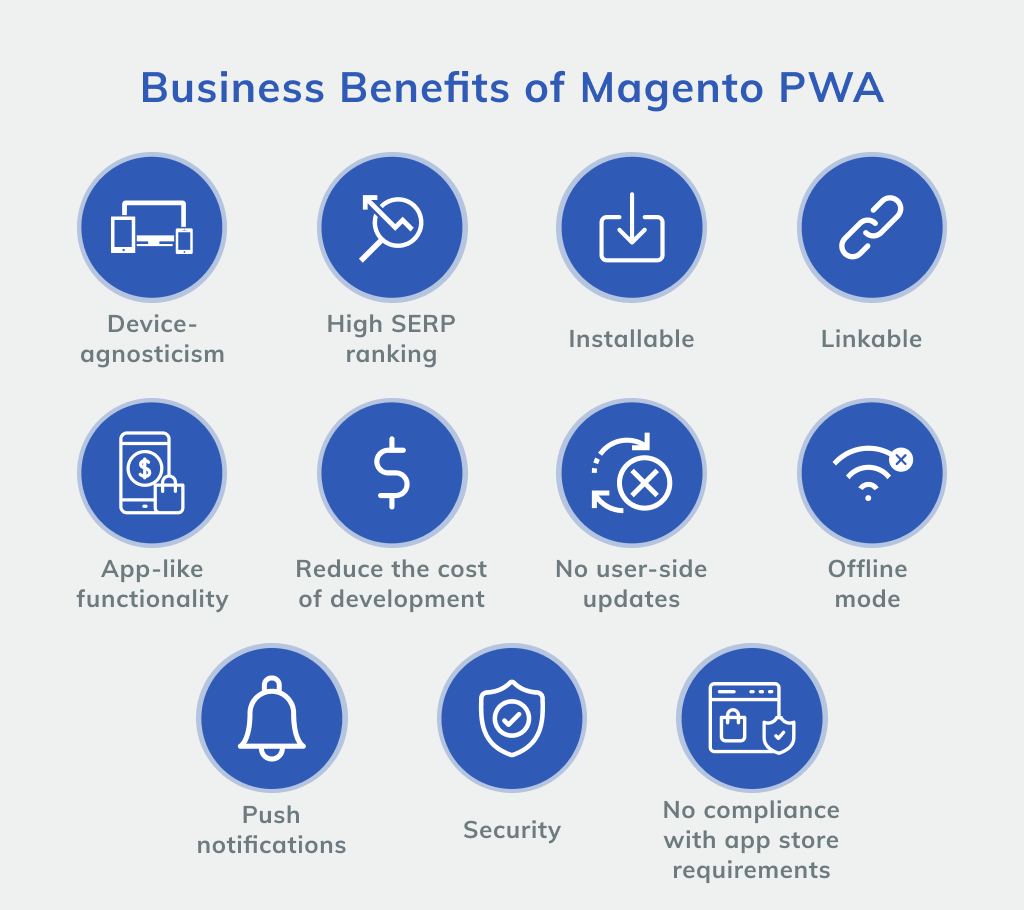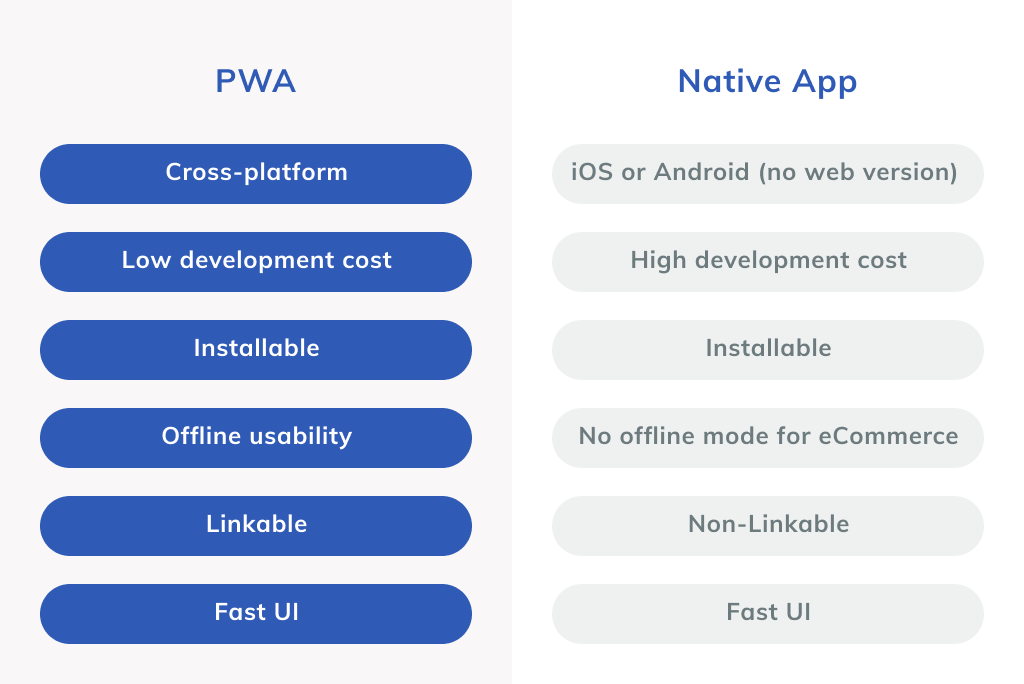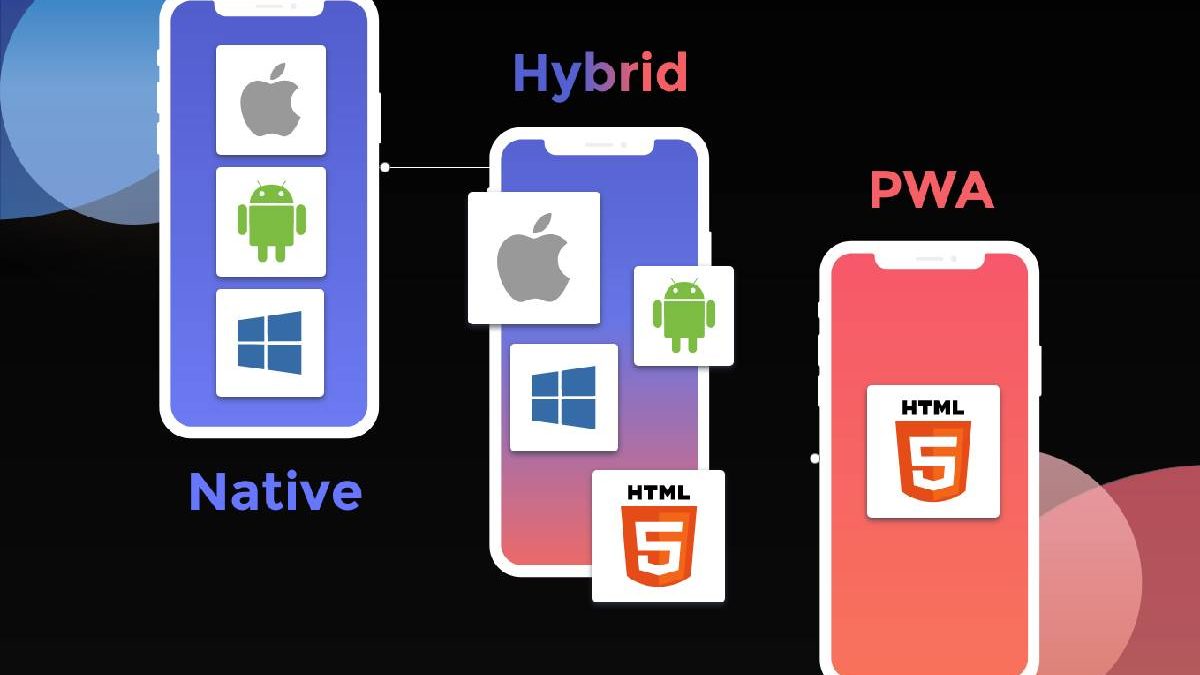Progressive Web Apps VS Native & Hybrid Apps-Global smartphone usage is estimated to increase to 3.8 billion users by the end of the following year from the current 3.5 billion users. In addition, Progressive Web Apps VS Native & Hybrid Apps nearly 40% of all commerce sales in the USA in 2018 used mobile devices.
Every eCommerce company that wants to avoid losing potential clients must have a mobile presence. Fortunately, mCommerce may do this in a variety of ways. Applications that immediately come to mind might be native and hybrid, but are they that good?
In-depth comparisons of responsive webpages, native and hybrid apps, and Magento PWAs are the focus of this article. You’ll discover the ideal technologies for mobile commerce and which one is superior. For information on the following topics, read the article:
Table of Contents
PWAs, responsive websites, native applications, and hybrid apps – what are they?
The advantages of developing a Magento PWA and how it differs from and is related to mobile apps and responsive websites, the top eCommerce solution
- Experience with PWA Development at GoMage
- An Overview of Every Solution
- It could be challenging to choose due to the variety of options. However, each can provide value to your company and has its advantages.
- Start by reviewing the fundamentals and the key terms used to describe each solution.
What is a PWA?
The best elements of webpages and mobile applications combine in advanced web applications (PWAs). They are a better alternative to websites than native applications because PWAs can be installed on mobile devices just like native apps and offer the same user experience.
Suppose you want to learn new ways to communicate with clients. PWAs are an excellent remedy. You may reduce development time and costs by creating a Magento PWA. A single progressive web application that functions on all current devices can develop in place of publishing a responsive website, an iOS app, and an Android app.
Magento gives Magento Progressive Web Apps VS Native & Hybrid Apps PWA a lot of consideration. According to Magento, PWA will be the primary driver of future platform growth, which made this announcement during Magento Live Europe in Amsterdam in October 2019. The business intends to put a lot of work into developing PWA Studio and will provide a new section to the Magento Marketplace to sell extensions and themes for Magento PWA storefronts.
We concur with Magento that Magento PWA is the future of eCommerce. The advantages of PWA are undeniable when compared to responsive websites, native apps, and hybrid apps.
Let’s examine the significant benefits a company can receive by switching to Magento PWA. You’ll gain a deeper comprehension of PWA’s importance and the rationale behind large corporations already adopting technology.
What is a Native App?
A software programme created specifically for a mobile operating system and written in a programming language designed for that platform is known as a native application. Today’s market leaders for mobile devices are iOS and Android.
The smooth user experience and powerful functionality created for an operating system are the primary advantages of native programmes. Furthermore, depending on the device’s model, these apps can be installed on a smartphone or tablet and used offline.
When developing a native app, you must submit it to Google Play or the App Store for review, meet all the standards before users can access it, and maintain compliance when made available on an app store.
What is a Hybrid App?
All mobile devices can use hybrid applications. As a result, development can speed up and reduce costs because of the shared code base. In addition, organizations can design a single app rather than individual Android and iOS versions.
Despite their benefits, hybrid apps can’t claim great performance or the best user experience. Moreover, in most circumstances, it is impossible to make apps that primarily rely on a device’s hardware while utilizing all the unique features of an operating system.
They are a good option for a minimally valuable product because of all these aspects, but they are not so wonderful for fully developed digital products.
Hybrid apps release through app stores, just like native apps. You must therefore meet their standards to submit your application there. Additionally, there is always a chance that an app store will unceremoniously remove your app.
Benefits & Features of Magento PWA Development
Magento PWA is a potent tool for eCommerce companies. The best benefits include a higher conversion rate, a faster eCommerce website speed, omnipresence across all operating systems, and more.
As you read this section, you’ll learn about Magento 2 PWA’s main advantages.

Device-agnosticism
The primary advantage of Magento’s advanced web applications is this. Unlike previous alternatives, users may interact with PWAs on any device or web browser. By doing this, you automatically improve your chances of growing your consumer base.
PWAs with high SERP rankings have a lot in common with conventional websites, one of which is ranked by search engines. However, Magento advanced web applications are rated in the top positions in Google SERP as Google now pays great attention to the consumer experience that websites deliver across all devices.
Implementing SEO strategies will increase the discoverability of your application. In addition, you can outperform rivals if you combine the efforts with paid advertisements and other marketing initiatives.
Installable
Magento PWAs have a lot in common with both mobile applications and websites. As a result, they can be installed on devices in the same way as regular apps.
Consider Twitter as an example. It allows you to download Twitter PWA from a mobile device when you access its website. Because you enable consumers to download and install your app directly from your website, they don’t need to go through extra hoops to download it through an app store. As a result, users are more inclined to download your software to their devices.
Linkable
Sharing information and product links is crucial in eCommerce because it increases the likelihood of converting more clients. Magento PWA extracted the availability of Unified Resource Identified from websites (URI).
This identity enables it to save data and load a new stage. Customers can share URLs with friends, bookmark pages in tabs, and keep links to products and pages inside your PWA. They can even bookmark pages in tabs and reload them when they open them again.
Magento 2 PWAs inherited the best features of conventional websites in this regard.
App-like features
Magento PWA transcends web browsers. As a result, users can install them on their devices and use them just like regular web pages. With these capabilities, PWAs are on par with native apps and outperform hybrid ones, which don’t necessarily offer the best user experience.
When creating a Magento PWA, developers are free to utilize all the capabilities of mobile devices.
Lower the price of development
Many businesses develop native apps rather than hybrid ones to give users a better user experience. If so, you will have to spend three times as much on a website, an Android app, and an iOS app to reach every potential target market. You can easily estimate how much you will need to spend because the average app development cost is around $50,000 for a single version with basic functionality.
About Magento PWA, you can cut your development costs significantly. You can construct a PWA rather than two native applications, plus a website. Even without factoring in the price of developing an eCommerce website, building a PWA for a large store with plenty of features and customizations will be far less expensive than building two native shopping applications.
no user-side updates
Magento PWA is the solution if you’re seeking a means to give customers a seamless shopping experience and access to the most recent features. PWAs don’t request permission to update, in contrast to conventional applications. Even if users neglect to give themselves time for updates, they are all carried out automatically.
Offline mode
Thanks to advanced web applications, customers can shop at your store without an internet connection.
The built-in cache mechanism automatically saves data about all viewed sites, enabling offline app functioning. Magento PWA will address the issue if your target audience disperses over several different counties and not every place has a strong network connection. Such options are advantageous for mobile shopping as well. Users can read the content even in the event of an unexpected connection loss when they browse your store while travelling, such as on the train.
With a minimum 35% reduction in catalogue abandonment rate, this characteristic offers a real-world advantage. In addition, users benefit from a seamless user experience and are more likely to continue to the checkout page because they can continue shopping without access to the internet.
pushing notifications
One effective tool for mobile applications is pushing notifications. By Google’s research, 60% of PWA users consent to these applications sending push notifications. Native applications make up around 30% of the total.
To encourage the customer to return to your store, you may make full use of push notifications by sending reminders about abandoned carts and informing them of special deals, discounts, holidays, sales, and other information. Push notifications for the Magento PWA can be an effective tool for retaining and engaging users.
Security
Progressive web applications give enterprises a high level of security and other advantages. For example, the HTTPS protocol guarantees data security and defence against several types of attacks, such as man-in-the-middle and Magecart attacks. Additionally shielded from blocking shopping and content modification is Magento PWA.
No compliance with app store requirements
Progressive web apps are not made available through app stores, unlike hybrid and native programmes. The procedure for releasing apps is essential to streamline as a result. However, you must adhere to their rules to get your application featured in app stores. Compliance is required as long as you want your apps to remain in an app store. However, there is always the chance that an app store suddenly restricts a specific programme without warning.
Because PWAs are disseminated similarly to standard websites and provide the installation option on a device, they are exempt from the requirements of app stores.
The advantages you will receive using Magento PWA go well beyond those already mentioned.
Comparison of websites, native apps, hybrid apps, and progressive web apps
The following comparison shows the critical advantages of Magento PWA over other well-liked options. You can learn about all the differences between them and which is best for eCommerce by using the comparison.
PWA vs Responsive website
Despite the similarities between responsive websites and progressive web apps, some significant differences exist. Let’s examine what distinguishes these two categories of solutions.
Progressive Web App vs Hybrid App
PWA vs Native App
The use of advanced web applications is on the rise. The demand for a mobile presence will only increase as mCommerce expands. Additionally, thanks to the most recent Google search engine improvements, websites that offer a fantastic user experience on all platforms appear higher in search results.

Progressive Web Apps VS Native & Hybrid Apps easily defeat hybrid, native, and responsive websites, as seen from the comparison of PWA versus.
PWA provides numerous chances for business expansion and offers the following advantages:
Quicker development times, reduced development costs, and higher mobile conversion rates
More critical, push notifications to access a target audience across all platforms and devices faster website load times that reduce bounce rates.
Conclusion:
Many businesses try to cut costs when implementing new technologies. Still, Progressive Web Apps VS Native & Hybrid Apps after working on numerous mobile app development projects, we can assure you that user experience should be the primary consideration (instead of cost) when determining whether to develop a web, native or hybrid application.
Your business’s needs and goals, the application’s requirements, the developer’s technical skills, and the project schedule are just a few variables that will determine whether you develop a native, web, or hybrid application.
Before beginning development, it is crucial to understand the benefits and drawbacks of each application type because each one presents a unique set of opportunities and difficulties.
Also read: Progressive Web Apps, What is a PWA for Beginners

